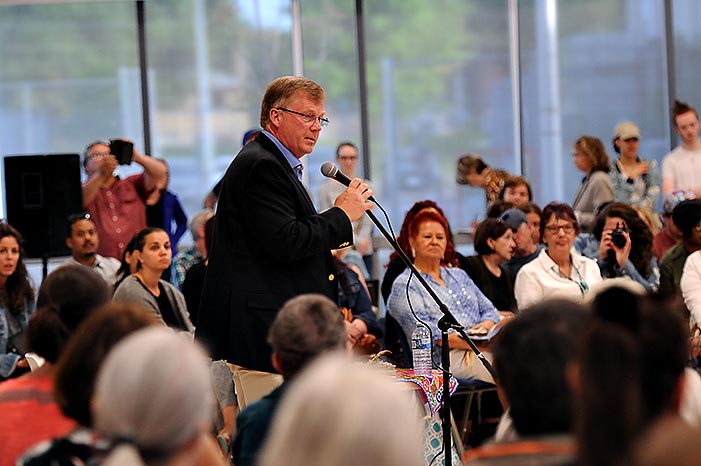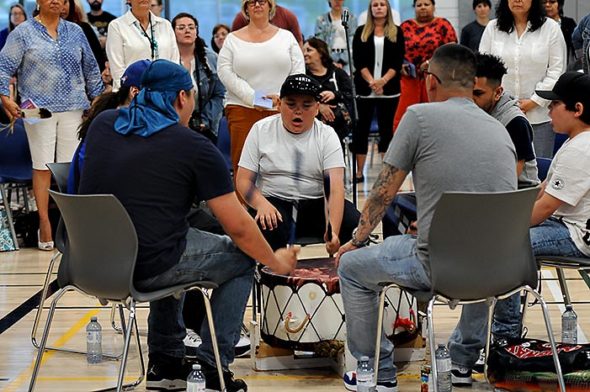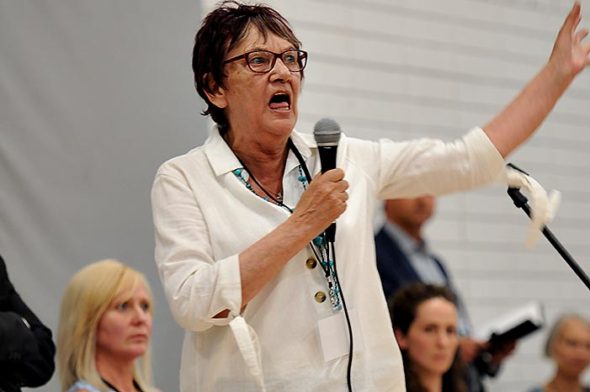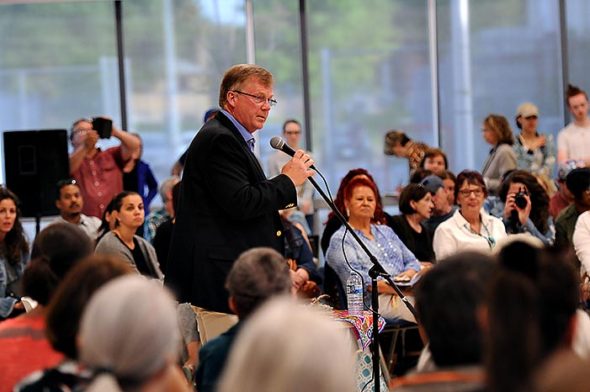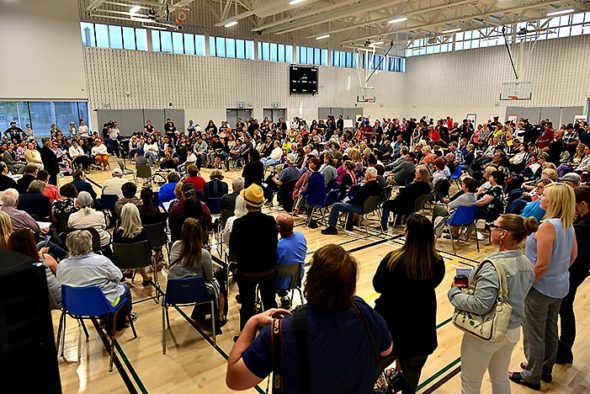
Thunder Woman Healing Lodge meeting at Birchmount Community Centre on June 12. Photo: John Smee/Bluffs Monitor
By Hedy Korbee
Supporters, critics and people simply seeking information turned out in large numbers at an emotionally charged community meeting on Wednesday to discuss a proposed Indigenous women’s healing lodge at 2217 Kingston Rd. at Cliffside Dr.
The meeting was organized by the Thunder Woman Healing Lodge (TWHL), which plans to build a six-storey residential care facility for Indigenous women to “support the healing, rehabilitation and meaningful re-integration of Aboriginal women offenders.”
“This vision is to give Aboriginal women a place in Toronto to heal themselves from suffering systemic and personal harm; a place where they can grow, learn and embrace cultural values; a place where they can reclaim voice, spirit and wellness,” according to the TWHL website.
The facility is not a prison. The women who will live in the supervised healing lodge are local Scarborough women who are transitioning back into society. They have either served their correctional sentence and been released or not yet been convicted of a crime.
Emotionally charged meeting
More than 400 people attended the meeting at Birchmount Community Centre and it was clear that many of them showed up to counteract a wave of negative social media commentary on local Facebook pages over the previous week.
The meeting, complete with a smudging ceremony and cultural drumming by the All Nation Juniors, was facilitated by Indigenous elder Ken Richard who told participants that everybody’s voice is legitimate and asked speakers to manage their feelings and engage in respectful dialogue.
Two of the first few questions were quite terse and dealt with the fact that the healing lodge application cites the need for only one parking spot, when 24 women are expected to live there.
It was explained that the healing lodge is different from a regular apartment building and the parking spots will only required by the healing lodge staff, according to a study approved by the City of Toronto.
Kelly Potvin of the Elizabeth Fry Society phrased it more bluntly: “These housing units are all affordable housing so they’re for people who are living in poverty. Most people who are living in poverty don’t have cars.”
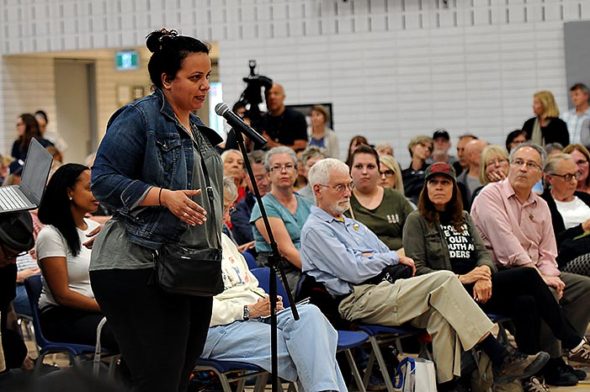 A woman who owns the business at 2215 Kingston Rd., next door to the proposed site, said she was disappointed because she just found out about the healing lodge on social media, a comment which received boos and loud shouts from the audience.
A woman who owns the business at 2215 Kingston Rd., next door to the proposed site, said she was disappointed because she just found out about the healing lodge on social media, a comment which received boos and loud shouts from the audience.
“Things are being misconstrued. We are being misinformed. I need straight answers,” she said, explaining that she was approached by Patti Pettigrew three months ago, asking if she would lease four parking spots to the healing lodge.
“At the time that I approached you I didn’t know what our parking requirements were,” said Patti Pettigrew, the TWHL president. “I honestly didn’t know. And I thought, “well if I want to have my crossed and my I’s dotted, maybe I should just explore and see you’re interested in leasing some parking spots”.
Santbir Pannu, who has lived in the community for ten years, said he was really disappointed to hear people booing and jeering over issues like parking when the issue at hand is helping people rebuild their lives.
“I think that with the report that came up last week from the Missing and Murdered Women (inquiry), this is an opportunity for settlers like me to take a step towards reconciliation. I think we forget that this is not our land,” Pannu said, asking people to support Canada’s most marginalized community.
“I want you to ask ourselves what kind of world do we want for our children? Do we want one based on reconciliation with the people whose land that we’re living on? Or do we want one based on the conflict and arrogance?” Pannu said.
As long lineups formed at the microphones, more and more speakers, both Indigenous and non-Indigenous, expressed their support for the healing lodge.
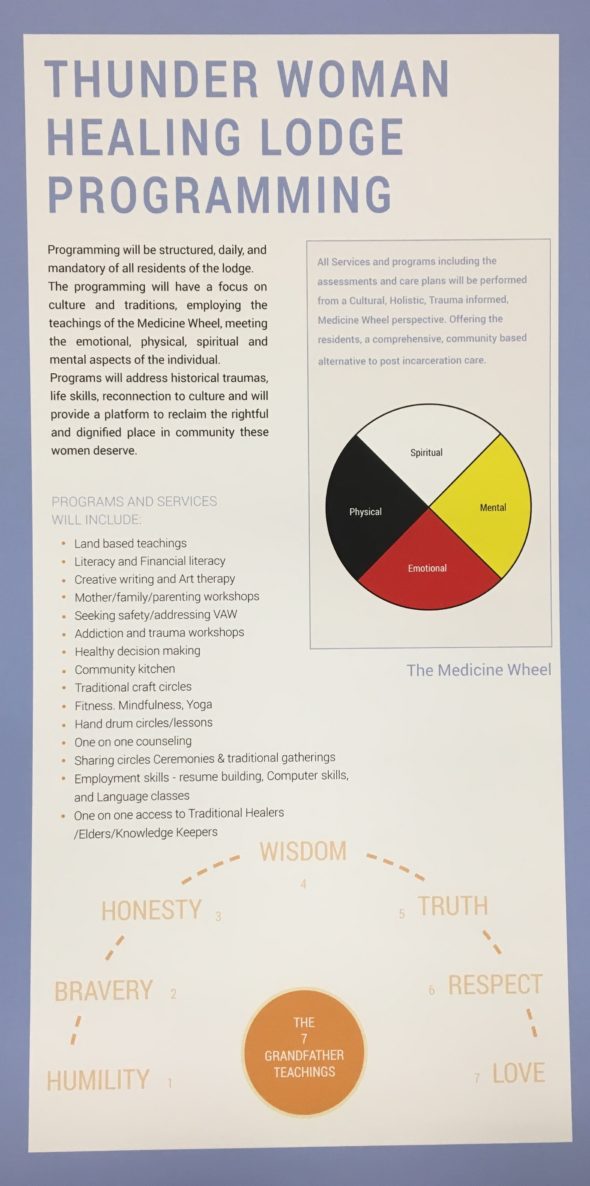 Teniesha Ochrym said she was speaking as both an Indigenous woman and somebody who provides health and mental wellness supports at a community centre in Scarborough. She said there are huge gaps in local services for Indigenous women facing domestic abuse, mental health problems, intergenerational trauma (and) missing and murdered (women), because most supports are located downtown.
Teniesha Ochrym said she was speaking as both an Indigenous woman and somebody who provides health and mental wellness supports at a community centre in Scarborough. She said there are huge gaps in local services for Indigenous women facing domestic abuse, mental health problems, intergenerational trauma (and) missing and murdered (women), because most supports are located downtown.
“Our community is to simply saying that we are looking for a safe space to heal our community. We acknowledge that we are all one and it is not appropriate for us on our own lands to have to ask,” Ochrym said to loud, sustained applause and cheering from the audience.
And there were personal testimonies from people like MacKenzie Whiteman, a federal parolee whose father was Apache.
“I’m a federal inmate. I went to jail in the penitentiary for violence and for 17 years I’ve struggled with mental health and addiction,” Whiteman told Birch Cliff News after the meeting. And I was lost. The only thing that’s helped me get on the right track and become productive and become a member of society was my culture, was my teachings, was my elders, was the gifts of having my identity given back to me. And it was through programs like the one they’re trying to bring for the women to Scarborough that I became the woman I was meant to be. Without that I would still be out there using I’d still be out there committing crime. Now I’m working on myself. And I have the courage. And I have the self-esteem to do it. And I have the tools to do it because of my culture. Without my culture I would just be another addict running the streets.”

Daniel McCaffrey at the microphone at Thunder Woman Healing Lodge meeting. Photo Credit: John Smee/Bluffs Monitor
There were also speakers such as Daniel McCaffrey, who lives 50 metres from the proposed healing lodge. Visibly angry, he cited statistics about Indigenous offenders and raised concerns that local school children, the elderly and disabled users of Variety Village might be at risk.
“You are inviting the most dangerous criminals potentially to our community and our community already houses the most vulnerable people in Canada. Why are you doing this to our community and why are we only hearing about this through a planning meeting?” McCaffrey said.
Patti Pettigrew responded that McCaffrey was reading statistics from the Correctional Service of Canada about healing lodges owned by the federal government, which is not the same kind of lodge that is being proposed for Kingston Rd. She described it as cultural appropriation by the federal government.
Someone from the audience shouted the name of Terri-Lynne McClintic, who was controversially transferred to a CSC healing lodge after pleading guilty to first degree murder in the death of 9-year old Tori Stafford in 2009.
“Let me tell you how I feel about that. That was the absolute cruelest thing that Corrections Canada could have done to Tori’s parents,” Pettigrew said.” When Corrections Canada made that decision to transfer McClintic into that healing lodge, which they owned and operated, they knew that it would cause controversy. They knew it was a cruel decision. They knew it was a stupid decision and they knew people would find out. And where did people direct through anger to? They directed it towards healing lodges.”
The meeting was lively, emotional and at times confusing for people with open minds who came to the community centre seeking information.
Part of the problem was that the Thunder Woman Healing Lodge didn’t use its opening statement to present facts and explain exactly what the healing lodge was all about. When Pettigrew first stood up to speak she confessed to the crowd that she was nervous and made a short emotional statement instead of an explanatory one. What followed was a conversation that lacked a shared frame of reference.
Some local residents left early and they were identified by other community members as people who were making racist remarks from the crowd.
But there were others with open minds and hearts like Meagan Ryder, who simply left in frustration because they weren’t getting the answers they came looking for.
“I don’t have any concerns about the building or the lodge. I unfortunately didn’t find that people were asking very direct questions to clear up misconceptions that people have. So I found that unfortunate. I think there was just too many people sort of rambling on about their own personal opinion of irrelevant information. I think a lot more people wanted to ask questions and get quick answers and whatnot. But I’m glad I came.”
Details on the Thunder Woman Healing Lodge
For the record, the proposed native healing lodge is a six-storey building that does not require rezoning because it falls within the parameters of the Cliffside Zoning Bylaw, which permits commercial residential buildings of that height.
What’s been filed with the City of Toronto by TWHL is an application for a minor variance that will be adjudicated by the Committee of Adjustment.
The first floor will include a commercial space, likely a cafe or art gallery.
There will be 12 bed-sitting rooms on the second and third floor with shared kitchen and washroom facilities. Floors 4 – 6 will have 12 self-contained dwelling units or apartments. There will be culturally appropriate programming and 24-hour supervision.
You can learn more about the Thunder Woman Healing Lodge in this interim report.
Councillor Crawford on the process
There were complaints at the meeting from some residents who felt they didn’t have adequate notice of the healing lodge proposal.
Ward 20 Councillor Gary Crawford said he met with representatives from the Thunder Woman Healing Lodge 1 1/2 years ago and didn’t hear back from them until last month when he learned their application was going to the Committee of Adjustment.
Because this is a minor variance application and not a rezoning, the Committee of Adjustment was only required to notify homes within 60 metres of the proposed healing lodge.
When the letters appeared on social media and stirred controversy, Crawford asked the Thunder Woman Healing Lodge to hold a community consultation meeting and then sent out 430 letters of notification.
Given the way the meeting unfolded, Crawford and Pettigrew have agreed to defer the June 27 Committee of Adjustment meeting and have set up a mechanism to allow for more community feedback through smaller meetings. People interested in participating can contact Crawford’s office.
“There are still concerns to be addressed and further questions to be answered and my commitment remains that the community needs to be heard,” Crawford said in statement released by his office.
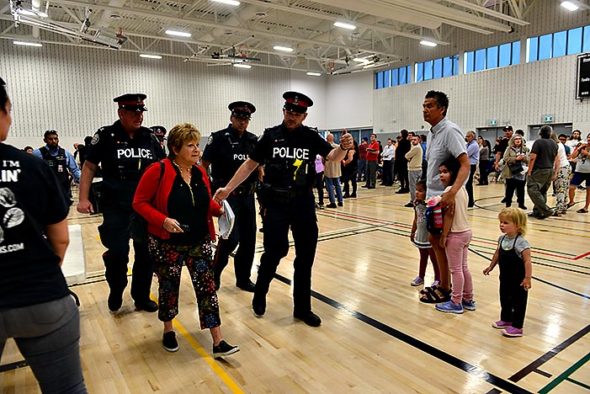
Toronto Sun columnist Sue-Anne Levy was ejected from the meeting by Toronto Police. Photo credit: John Smee/Bluffs Monitor.
What happened with the Toronto Sun columnist?
Controversial Toronto Sun columnist Sue-Ann Levy was ejected from the meeting by Toronto Police. In an interview with Birch Cliff News, Levy said she was trying to ask Pettigrew specific questions during a smoke break outside the building about who would be housed in the healing lodge. She said she felt Pettigrew was “beating around the bush” inside. She said her interview was interrupted when one of Pettigrew’s supporters pulled her away to take her back inside.
Levy said she tried to follow Pettigrew to finish her interview.
“At that point a woman with a baseball cap on backwards and tattoos all over started pushing me away and blocking her from me and pushed her to the front. At which point one of Toronto’s finest came up to me put his hand on my back and pushed me out of the meeting and I said “please don’t touch me. And he said you’re leaving the meeting now.”
Toronto Police Sgt. David Liska said he removed Levy from the meeting because she was chasing one of the organizers, holding up a microphone or a cell phone, and ran into spectators with their backs turned because they were watching the presentation.
“The individual in question was just behaving inappropriately,” Liska said. “This is an emotionally charged meeting. There are people who are very passionate here and we just want to make sure that everybody has the right to be heard and not disturbed.”

